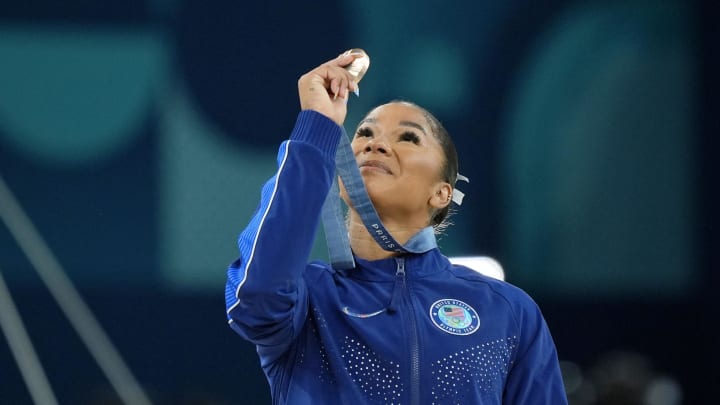Jordan Chiles Shouldn’t Have to Give Back Her Medal—There’s a Better Solution

PARIS — Who is better off today, now that the International Olympic Committee has stripped U.S. gymnast Jordan Chiles of her bronze medal in the women’s floor exercise and reallocated it to Romania’s Ana Bǎrbosu because of a judging error? Certainly not Chiles, who after doing nothing wrong finds herself penalized. Not Bǎrbosu, who was the subject of one of the most excruciating moments of these Olympics when she realized midway through her celebration of third place that she had taken fourth and—presumably not wishing to inflict the same pain on another—asked to share bronze. Not the Olympics themselves, which will now end the most successful Games in recent memory with this unnecessary uproar. And not the public, which should want—as the authorities should want—to get it right.
This is not right.
After Chiles completed her routine to close out the floor exercise event final Aug. 5, the scoreboard read: Brazil’s Rebeca Andrade in first, with 14.166 points; the U.S.’s Simone Biles in second, with 14.133; Bǎrbosu ana in third, with 13.700; her teammate Sabrina Maneca-Voinea in fourth, with the same score but a lower execution score; and Chiles in fifth, with 13.666. Bǎrbosu wrapped herself in a Romanian flag and surged onto the floor to celebrate. But the U.S. had submitted a scoring inquiry into Chiles’s score, believing her difficulty was a tenth of a point higher than she’d been credited.
The judges accepted the inquiry. The scoreboard reflected that Chiles was now in third. Bǎrbosu turned, saw it, dropped the flag, burst into tears and clutched her stomach, almost doubling over. Meanwhile, Chiles streaked past in celebration. The juxtaposition was agonizing, perhaps the worst image of an otherwise resplendent gymnastics competition.
So, naturally, officials have recreated it in the reverse. The day after the final, Romania appealed the decision to the Court of Arbitration for Sport (CAS), saying that the inquiry was submitted late; Maneca-Voinea was incorrectly assessed a one-tenth deduction; and all three athletes should share bronze. CAS decided on Saturday to uphold only the first request: The U.S. inquiry came four seconds late. The original scores, and their rankings, would be restored. CAS added that it was up to the International Gymnastics Federation and the IOC to enforce the ruling, which they announced on Sunday that they would do. The IOC said in a statement that it had asked Chiles to return her medal.
The rule itself is preposterous: All gymnasts have close to four minutes (the length of the next gymnast’s routine) to submit an inquiry except the last gymnast of a rotation, who has one minute? Whose idea was that? But the rule is the rule, so fine. The issue now is that the judges accepted the inquiry at the time. Presumably they have clocks; Omega’s branding is all over this place. Once the judges accepted an inquiry, any subsequent arguing about it should not penalize the person who submitted it.
And most of all: The judges said the inquiry was correct. They had made a mistake when calculating Chiles’s difficulty score. So in effect CAS and the FIG and the IOC and the rest of the alphabet soup deciding this have announced that they would prefer the scores be wrong.
If Chiles had been accused of doping or otherwise cheating, it would make sense to take her medal away from her. But all she did was her routine, which officials agreed when given time to think about it merited the third-best score of the competition.
The fix here is obvious: Give them both bronze. (Romania never submitted an inquiry into Maneca-Voinea’s score, so just about everyone agrees she is out of luck here.) Would either Chiles or Bǎrbosu feel cheated by such an outcome? On the contrary, they asked for it. As always, the athletes are the ones redeeming the entire corrupt enterprise: After Chiles won bronze in real time, she suggested to Biles that they bow to Andrade on the podium, creating an indelible image of Olympic spirit that all these acronyms celebrated then, and should study now.
The oddest part of all this is they are getting a second chance to answer a question like this correctly, and they are failing. At the 2004 Olympics, in Athens, judges awarded Paul Hamm, of the U.S., the individual all-around title by 12 hundredths of a point over Yang Tae-young, of South Korea, then almost immediately announced that they’d gotten it wrong: Yang's start value on the parallel bars was actually a tenth of a point higher than he’d been credited. FIG president Bruno Grandi asked Hamm to return his medal. Eventually CAS declined to change the results, saying that the error happened during competition, so it was impossible to determine how other gymnasts might have changed their routines to account for Yang’s higher start value. Hamm kept gold; Yang kept silver.
That was wrong, too, for the same reason. In both cases, the people entrusted with running the competition screwed up. The least they can do now is not make it worse.

Stephanie Apstein is a senior writer covering baseball and Olympic sports for Sports Illustrated, where she started as an intern in 2011. She has covered 10 World Series and three Olympics, and is a frequent contributor to SportsNet New York's Baseball Night in New York. Apstein has twice won top honors from the Associated Press Sports Editors, and her work has been included in the Best American Sports Writing book series. A member of the Baseball Writers Association of America who serves as its New York chapter vice chair, she graduated from Trinity College with a bachelor's in French and Italian, and has a master's in journalism from Columbia University.
Follow stephapstein